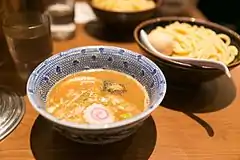Ramen Street
Ramen Street is an area in the underground mall of the Tokyo Station railway station's Yaesu side that has eight restaurants specializing in ramen dishes.[1][2][3][4] Some of the restaurants at Ramen Street include Rokurinsha, which specializes in tsukemen, Kanisenmon Keisuke, specializing in crab ramen dishes, and Nidaime Keisuke Ebi Soba Gaiden, specializing in prawn ramen dishes.

Overview
Tokyo Station is located in the Marunouchi business district of Tokyo, Japan, and Ramen Street is located on the basement floor of the underground mall.[3][5][6] Tokyo station also has an area called "Kitchen Street" that purveys foods.[7] Additionally, an unrelated and unofficially-named "Ramen Street" exists on the top floor of Kyōto Station in Kyoto, Japan that has some ramen restaurants.[8]
Restaurants

As of January 2017, eight ramen restaurants are located at Ramen Street,[1][9] and in 2011 it had four restaurants.[10] All restaurants use a ticketing system, where consumers purchase a ticket from a central vending machine to select their order, after which the ticket is given to wait staff to order food.[1][11] In 2013, prices varied between approximately 850–1000 yen.[11] The restaurants at Ramen Street serve a great deal of commuters,[1][11] along with general travelers and train company personnel.[6]
Rokurinsha restaurant is one of the most popular restaurants at Ramen Street, and sometimes has long lines of people waiting to be served that overflows outside of the restaurant, with waiting times that can sometimes range from 40–60 minutes.[2][3][5] Rokurinsha is well-known for specializing in tsukemen, a dish in Japanese cuisine consisting of separate servings of noodles and soup or broth, whereby the noodles are dipped in the soup.[7][12]
Other restaurants at Ramen Street include Kanisenmon Keisuke, which specializes in crab-based ramen dishes (Kanisenmon means "specializing in crab" in English), Nidaime Keisuke Ebi Soba Gaiden, which opened in 2009 and specializes in prawn-based ramen dishes, and Kagari.[11][12][13]
References
- Russell, Michael (April 20, 2013). "A walk down Tokyo's Ramen Street". The Oregonian. Retrieved February 22, 2017.
- Rosenbloom, Stephanie (October 30, 2015). "Solo in Tokyo". The New York Times. Retrieved February 22, 2017.
- "Tokyo Ramen Street's Rokurinsha Makes A Mean Bowl of Tsukemen Noodles". Serious Eats. February 16, 2017. Retrieved February 22, 2017.
- "Navigating Tokyo 'Ramen Street': 8 Great Ramen Stops, All in One Place". Serious Eats. February 16, 2017. Retrieved February 22, 2017.
- Swinnerton, Robbie (July 6, 2012). "Rokurinsha: A ramen line-up worth dipping into". The Japan Times. Retrieved February 22, 2017.
- WLS; Dolinsky, Steve (February 18, 2016). "ABC7's Steve Dolinsky eats his way through Japan". ABC7 Chicago. Retrieved February 22, 2017.
- Goode, Brandi (December 22, 2014). "Japan's iconic Tokyo Station turns 100". CNN. Retrieved February 22, 2017.
- Siese, April (October 10, 2016). "Finding the flavor of Japan's incredible ramen museum". The Daily Dot. Retrieved February 22, 2017.
- Crossley-Baxter, Lily (January 31, 2017). "Tokyo Ramen Street – A One-Stop Noodle Shop". Tokyo Cheapo.
- Richmond, S.; Dodd, J. (2011). The Rough Guide to Tokyo. Rough Guides. p. 140. ISBN 978-1-4053-8255-7.
- Silverstein, Perri (July 4, 2013). "Tokyo Ramen Street". Japan Travel. Retrieved February 22, 2017.
- Quek, Eunice (April 25, 2016). "Noodle king Keisuke Takeda's rocky road to success". The Straits Times. Retrieved February 22, 2017.
- Swinnerton, Robbie (May 25, 2016). "The 38 Essential Tokyo Restaurants". Eater. Retrieved February 22, 2017.